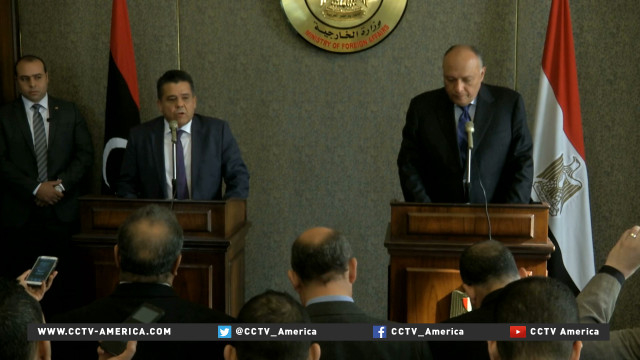Regional powers remain divided on how to support Libya. The disagreements could hamper efforts to return the country to stability.
CCTV’s Adel El Mahrouky reported this story from Cairo.

The United States and Britain have opposed lifting of the Arms embargo on Libya.
Along with several European powers they argue that a national unity government should be formed first, then they could supply that government with weapons.
On the other hand, regional powers including Libya and Egypt argue that such a delay would enable and reinforce the militants hold on power.
“The calls to conditionally support the legitimate Libyan government after the success of the national talks, is mixing up the facts,” Egypt Foreign Minister Sameh Shoukry said. “There is no relation between the political solution that we seek between honorable Libyans who have not been involved in terrorist acts, and the necessity to resist terrorist groups. Unless, the aim is to enable a faction that resorts to violence and terror, above the talks and the Libyan people.”
Middle East powers were divided with countries like Turkey, Qatar and Sudan supporting Islamists.
Other Arab countries support the internationally recognized Tobrok government.
“Western countries are leaving Arabs and regional powers to deal directly with the troubles in Libya, and Arabs are holding the West responsible for having NATO remove Gaddafi, and leaving the country to deteriorate afterwards,” Political Analyst for Al Ahram Democracy Review Beshir Abdelfattah said. “So Libyan factions are fighting each other and their regional allies are rivals. I am afraid that all of this and the division among Arabs, will reflect on the Libyan talks and it’ll take much more time than it should.”
Libya’s neighboring countries have nominated Egypt to take over the political solution file.
But their latest airstrikes have deepened the gap with the Islamists in Tripoli.
Countries like Algeria and Tunisia have criticized the strikes.
Neither Western nor regional powers have provided a concrete method to fight the rise of terrorism threat from Libya.
While the reconciliation talks are expected to take some time to form a national unity government, groups like the Islamic state will remain to have a safe haven in Libya.
 CGTN America
CGTN America
